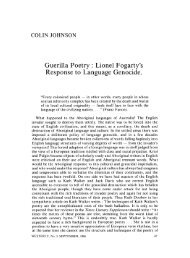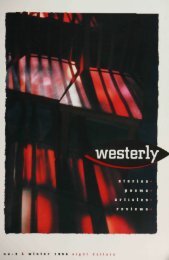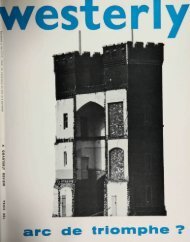Lock your warm hands above the chillingheartand for a time I live without my fear.Grope in the night to find me and embracefor the dark preludes of the drums begin,and round us, round the company of lovers,death draws his cordons in.This poem serves to introduce us to the prevailingmood of her second volume. Womanto Man. Love is a recurring theme in these andlater poems. At first it begins as the love betweenman and woman; later it takes on amore transcendental quality—love, the movingforce of all life. Just as the landscape poems,wherever they occur in the flow of her poetry,are peopled with personal memories or derivations,so her love poems have a deeply personalquality. It is doubtful whether any aspectof what she says in the title-poem of thisvolume has ever been better said and a greatdeal would be lost were it not quoted in full:The eyeless labourer in the night,the selfless, shapeless seed I hold,builds for its resurrection day—silent and swift and deep from sightforesees the unimagined light.This is no child with a child's face;this has no name to name it by:yet you and I have known it well.This is our hunter and our chase,the third who lay in our embrace.This is the strength that your arm knows,the arc of flesh that is my breast,the precise crystals of our eyes.This is the blood's wild tree that growsthe intricate and folded rose.This is the maker and the made;this is the question and reply;the blind head butting in the dark,the blaze of light along the blade.Oh hold me, for I am afraid.The tv/o poems which follow this, "Woman'sSong" and "Woman to Child", and anotherlater in the book, "The Unborn", are complementarypieces. They serve to estabhsh thefact that the physical "love" of which shewrites here, distinct from the more transcendental"love" to be found in many otherpoems, is always that of the woman. It is thelove for the child she is to bear; it is neverthe passionate love that men feel and write of,never the pursuit and the capture. Nor is itromantic love which is the subject of manypoems, most of them by men and some bywomen aping men. In this respect her attitudetowards love is similar to that of Mary Gilmore,although its expression is usually moreintense, more poetic. There are other similaritiesbetween these two women poets, notablyan emotional drawing from the well of thepast, an awareness of the significance in ourhistory of the displaced people, the aborigines(although here Mary Gilmore's poetry is farmore emotive) and a strong sense of commonhumanity. But there are sharp differences, too.Both are feminine, but Mary Gilmore is sometimesalso feminist, a characteristic never tobe found in Judith Wright's work or her personalattitudes. Nor does she espouse causes orchampion the underdog. And nothing could bemore out of character than to imagine MissWright rushing off to join a socialist colonyin Paraguay or anywhere else!Many poems in this second volume makereference to children: "Child in Wattle Tree',"The Child", "The World and the Child","Night and the Child". All these are to somedegree the result of an intense awareness ofthe impingement of age upon youth, part ofthe duality which is stressed in many otherways in other poems: light and dark, real andunreal, life and death. In "Lost Child", a sectionof the closing sequence of poems in thisbook, she gives a hint of the metaphysicalrealms she is to explore more frequently andat considerable depth in later volumes:Is the boy lost? Then I know where he isgone.He has gone climbing the terrible crags ofthe Sun.The searchers go through the green valley,shouting his name;the dogs are moaning on the hill for thescent of his track;but the men wiU all be hoarse and the dogslamebefore the Hamilton's boy is found orcomes back.Through the smouldering ice of the moonhe is stumbling alone.I shall rise from my dark and followwhere he is gone.I heard from my bed his bugle breath go byand the drum of his heart in the measure ofan old song.I shall travel into silence, and in that fiercecountryWhen we meet he will know he has beenaway too long.46 WESTERLY, No. 1, MARCH, 1968
They are looking for him now in the vinescrubover the hill,but I think he is alone in a place that Iknow well.Is the boy lost? Then I know where he isgone.He is climbing to Paradise up a river ofstars and stone.It may have been because the contemporarycritics expected some blending of the regionalismof her first volume and the various interpretationsof love that coloured her secondthat they paused uncertainly before the third.Its significance seems to be crystallized in fourlines from the title-poem, which is placed rightat the very end of the book:In the land of oblivionamong the black-mouthed ghosts,I knew my Selfthe sole reality.Henceforth and in many different ways, thepoet is to embark upon a voyage of discoveryin Self, a Self that is not merely of this timebut in all time. There are hints of a growingwonder at the miracle of life and of the lifegivingforce, love. This is the theme of theopening poem, "Dark Gift", in which the poetmarvels at the growth of a flower that "beginsin the dark where life is not" until with thecalyx folded she cries:Open, green hand, and givethe dark gift you hold.Oh wild mysterious gold!Oh act of passionate love!There is also a growing preoccupation herewith the receding of youth, with the approachof age, although she is still only in her latethirties. Often she re-states with no less forceand vision the regionalism of the best poems inThe Moving Image. Thus we have "ErodedHills", "Drought", "Unknown Water", "TheAncestors" and most memorably "Old House",which begins:Where now outside the weary house thepepperina,that great broken tree, gropes with its blindhandsand sings a moment in the magpie's voice,there he stood once,that redhaired man my great-great-grandfather,his long face amiable as an animal's,and thought of vines and horses.He moved in that mindless country like ared ant,running tireless in the summer heat amongthe trees—the nameless trees, the sleeping soil, theoriginal river—and said that the eastern slope would dofor a vineyard.It was no doubt the diversity of subjectsdealt with in this third volume which arousedsome misgivings in the minds of contemporarycritics, which caused T. Inglis Moore to feelthat "the poet has stopped on her path to lookaround, unsure of her way".'* But one cannotshare Elyne Mitchell's regret that often herlanguage and imagery were "similar to thoserecording the spiritual journeys of otherpoets''.'^ What different language or imagerycould possibly be desirable for "Birds", one ofher most profound poems?Whatever the bird is, is perfect for the bird.Weapon kestrel hard as a blade's curve,thrush round as a mother or a full drop ofwaterfruit-green parrot wise in his shriekingswerve—all are what bird is and do not reach beyondbird.Must we deny the validity of "weapon kestrel","blade's curve", "round as a mother or a fulldrop of water?" One wonders whether thispoem arose out of the fragmentary thought inR. D. FitzGerald's Essay on Memory: thatsometimes one sees "the bird's flight as thebird". Judith Wright is here emphasizing theapparent simplicity of motives guiding the livesof the "cruel kestrel", the "thrush in thetrembling dew beginning to sing", the "parrotclinging and quarrelling and veiling his queereye". This is contrasted with the complexityof human motives:But I am torn and beleaguered by my ownpeople.The blood that feeds my heart is the bloodthey gave meandmy heart is the house where they gatherand fight for dominion—all different, all with a wish and a will tosave me,to turn me into the ways of other people.The poem concludes with a yearning to.... melt the past, the present and thefuture in oneand find the words that lie behind all theselanguages.WESTERLY, No. 1, MARCH, 1968 47
- Page 1 and 2: westerlyA QUARTERLY REVIEW PRICE 60
- Page 3: westerlya quarterlyreviewEDITORIALC
- Page 6 and 7: Some JOURNALS published byUNIVERSIT
- Page 8 and 9: "WeU, maybe this one is, too.""With
- Page 10: a leer. What really infuriated her
- Page 13 and 14: Guest of honour? No less than the G
- Page 15 and 16: THE NAVIGATORS(To Albert Tucker)Bei
- Page 17 and 18: Mother of navigators.Beater of men.
- Page 19 and 20: Horizon-haunted men.Looters and Pir
- Page 21 and 22: On the table Taki had left a crumpl
- Page 23 and 24: FEARA thousand, thousand stars and
- Page 25 and 26: Judith ClarkeTHANK YOU MRS. GREENBE
- Page 27 and 28: Oh no, thought Lai Chandra, oh no.
- Page 29: "Nuance," she said- and "poetry,"an
- Page 32 and 33: TO WAKE, TO FLOWfor my wifeFor me t
- Page 34: With apparent indulgence Lola encou
- Page 39 and 40: or another, and some of the paintin
- Page 41: I do not think it has been fulfille
- Page 45 and 46: important thing for a writer who ha
- Page 47: from which she herself had sprung.
- Page 51 and 52: departure from what had come to be
- Page 53: ary degree the atmosphere of a trib
- Page 56 and 57: Blessed is the mother with her chil
- Page 58 and 59: IF YOU DON'T KNOW HOWDON'T DO ITft>
- Page 60 and 61: And yet perhaps both men drew from
- Page 62 and 63: other respects his attitude was mor
- Page 64 and 65: clearing and, as they are usually t
- Page 66 and 67: WHAT IS THECRITIC?The Critic is a c
- Page 68: JOHN KEATSBronze cast from a life m







